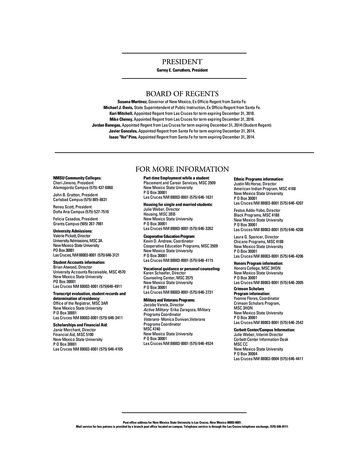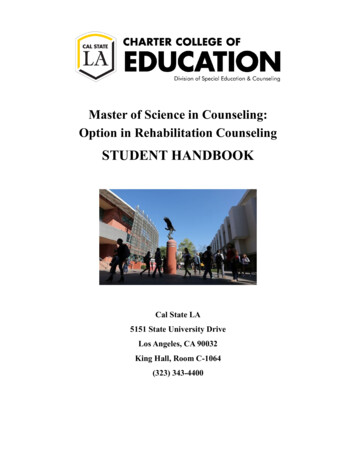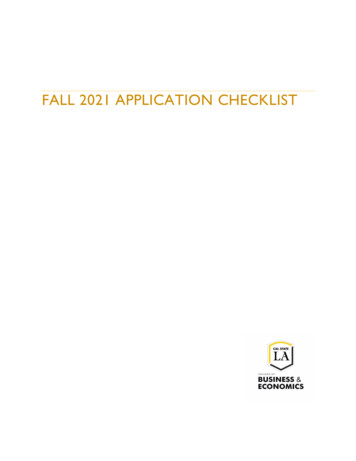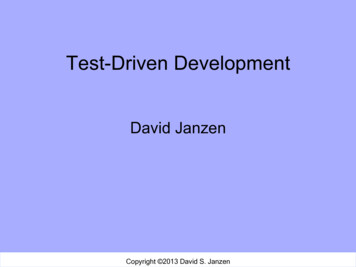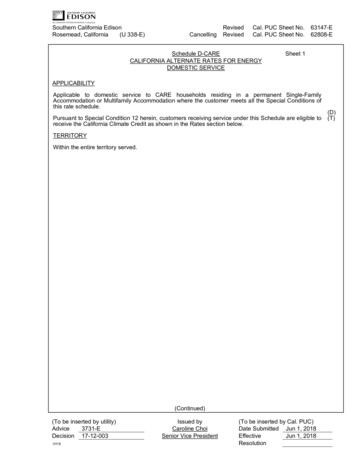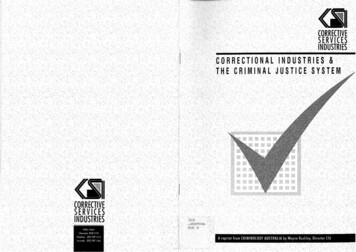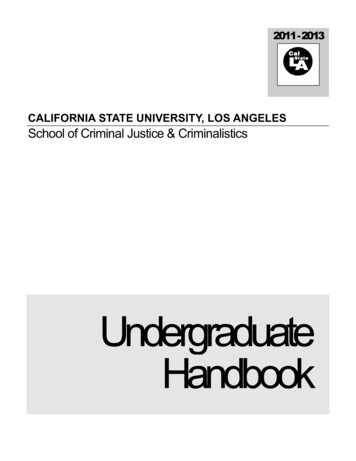
Transcription
2011 - 2013CALIFORNIA STATE UNIVERSITY, LOS ANGELESSchool of Criminal Justice & CriminalisticsUndergraduateHandbook
REQUIREMENTS CONTAINED WITHIN THIS HANDBOOK REFLECTTHE PROGRAM REQUIREMENTS FOR STUDENTS WHO BECOMECRIMINAL JUSTICE MAJORS IN FALL 2011 OR LATER.WHILE MOST OF THIS INFORMATION WILL BE THE SAME FOR ALLCRIMINAL JUSTICE MAJORS, STUDENTS WHO STARTED IN THECRIMINAL JUSTICE PROGRAM PRIOR TO FALL 2011 SHOULDCONSULT THE CATALOG PERTAINING TO THE YEAR THEY BECAMECRIMINAL JUSTICE MAJORS FOR THEIR SPECIFIC PROGRAM ANDGRADUATION REQUIREMENTS.
TABLE OF CONTENTSDirector’s Welcome.Overview of Criminal Justice Undergraduate Program.Admission Requirements.Major Requirements.Minor Requirements.Course Descriptions.Directed and Special Electives.Degree Plans and Making Progress.Transfer Credits.Failure Policy.Academic Disqualification.Applying to Graduate.School Office Location and Hours.Advisement.Full-Time Faculty.Student Associations.Tips for Student Success.University Resources.Careers in Criminal ppendix A: Program Sheet for BS in Criminal Justice.Appendix B: Program Sheet for Minor in Criminal Justice.Appendix C: Degree Plans for Freshmen.Appendix D: Degree Plans for Transfer Students.Appendix E: CJSA Membership Application.2325262830
DIRECTOR’S WELCOMEWelcome to the School of Criminal Justice and Criminalistics, located in the newHertzberg-Davis Forensic Science Center on the Cal State L.A. campus. You areembarking on a fascinating field of study at one of the West Coast’s top criminaljustice and criminalistics programs.The School offers programs leading to the Bachelor of Science degree in CriminalJustice, Master of Science degree in Criminal Justice, and Master of Sciencedegree in Criminalistics. The criminal justice curriculum offers coursework incriminal justice theory, research methodology and data analysis, criminal law,organizations, juvenile delinquency, program and criminalistics. It strives topromote understanding of key criminal, legal and scientific issues affectingcontemporary urban society, and respect for racial, ethnic, cultural, and genderdiversity.Programs within the School are designed to prepare students for positions in lawenforcement, corrections, criminal justice planning and/or law, as well as forfurther study in graduate or professional schools in any of these fields. Graduatesare hired by law enforcement, judicial, correctional and forensic science agenciesat the local, state, and federal levelsWith full and part-time faculty, state-of-the-art lecture and conference rooms, andmodern laboratory facilities, the School has assumed a position of leadership inthe field. While the School continues its strong teaching programs and ties with thecriminal justice community, it has also forged research initiatives with agenciesand laboratories to produce original scholarly publications and policy papers forthe benefit of the criminal justice system.Once again, welcome to the School of Criminal Justice and Criminalistics andplease contact me if you have questions or I can be of assistance to you.Sincerely,Joseph PetersonDirector and Professor1
OVERVIEW OF UNDERGRADUATE PROGRAMThe Bachelor of Science Degree in Criminal Justice is designed to preparestudents in the behavioral, natural and social science perspectives, as well as forfurther study in graduate or professional schools in these fields. The programprovides intensive study in areas of criminal justice theory, research methodologyand data analysis, criminal law, organizational functioning, and program planning.The program strives to promote understanding of key criminal and legal issues ofcontemporary society and respect for racial, ethnic, cultural, and gender diversity.By incorporating a multidisciplinary approach to study, the program provides twoimportant benefits for the student. First, it encourages the development of aninterrelated perspective with regard to the study of criminal justice. Thisperspective facilitates a more comprehensive focus on connections among theendeavors of crime prevention, law enforcement, adjudication, and punishment.Second, the program is designed to encourage the development of effectiveanalytical and problem-solving skills that will equip professionals with theintellectual capacity necessary for a variety of positions in criminal justice.The program is designed to achieve the following student learning outcomes asto their knowledge and skills:Knowledge1. To learn the basics of constitutional, substantive, and procedural criminal law2. To study the institutions of the criminal justice system and distinction betweenformal and informal justice decision-making3. To learn the difference between the adult and juvenile justice systems4. To study various means for measuring crime and victim-offender relationships5. To learn sociological, psychological, and behavioral theories of crime causation6. To learn the fundamentals of forensic science methodsSkills1. To acquire the necessary skills to read, digest, interpret and write about criminaljustice functions, agencies and research2. To work with qualitative and quantitative research information3. To critically think and express oneself orally and in writing2
ADMISSION REQUIREMENTSFirst time freshmen and transfer students seeking admission to the major mustfirst be admitted to the University as a Pre-Criminal Justice Major. Pre-majorsmust then directly apply to the School of Criminal Justice and Criminalistics to beaccepted as a major once they have met admission requirements.Criteria for admission to the major:1. Minimum cumulative GPA of 2.752. A grade of B- or better in CRIM 101 and 126 (or the equivalent)3. A grade of B- or better CRIM 301Students who completed CRIM 101 and 126 prior to Fall 2010 and did notreceive a B- or better in either course will be allowed a single opportunity to repeatthe course. On the second attempt, students must receive at least a B- to beeligible for admission to the major. No further attempts will be considered indetermining student eligibility.Students who completed CRIM 101 and 126 during or after Fall 2010 have onlythat single opportunity to take and achieve a grade of B- or better. If a grade of Bor better is not achieved on a student’s first attempt, the student will not be eligiblefor admission to the major.Students have a single opportunity to take and achieve a grade of B- or better inCRIM 301. This course can only be taken in our department. If a grade of B- orbetter is not achieved on a student’s first attempt, the student will not be eligible foradmission to the major.Returning Criminal Justice Majors who are required to reapply for admission tothe University will be readmitted as a Pre-Criminal Justice Major and consideredsubject to meeting the admission criteria as described above. Returning Majorsmay request to be readmitted to the University as a Criminal Justice Major; suchrequests must be made directly to the School or Undergraduate Program Director.Decisions to allow students readmission as Criminal Justice Majors will be basedupon progress in the program and academic performance.3
MAJOR REQUIREMENTSA total of 180 units is required for the Bachelor of Science degree in CriminalJustice. Students may transfer a maximum of 105 units for credit towards thedegree and must complete a minimum of 88 units for the major. For details aboutGeneral Education and other requirements constituting units outside the major,see Undergraduate Studies: General Information on the University website d 4&navoid 130 or a Schedule ofClasses.All students must complete a required core of 24 units in lower division courses.The total upper division requirement includes (1) a required core of 32 units inupper division courses and (2) 32 units in selected and directed elective courses.All students must see the School’s academic advisor before beginning theprogram. Students must also receive approval from the Undergraduate ProgramDirector before making any changes in the major program.CRIM 301 is a prerequisite to all upper division courses and cannot bewaived for Criminal Justice Majors. For more information, see page 11.Students must earn a grade of “C” or higher in all courses used to meetmajor curriculum requirements. Students who receive two failing grades withinthe upper or lower division core will be required to change their major (for moreinformation about this policy, see page 13).Students are strongly encouraged to monitor their academic progress. A programsheet showing the requirements for the Bachelor Science degree in CriminalJustice which students can use to track their progress is available in Appendix A.Lower Division Required Core Courses (24 units)CRIM 101CRIM 126CRIM 201CRIM 202CRIM 203CRIM 208Introduction to Administration of Justice (4)Concepts of Criminal Law (4)Correctional Systems (4)Police and Society (4)Judicial Organization (4)Introduction to Forensic Science for Criminal Justice Majors (4)Upper Division Required Core Courses (32 units)CRIM 301CRIM 303CRIM 309CRIM 310CRIM 330CRIM 428CRIM 483CRIM 492Written Communication in Criminal Justice (4)Theories and Perspectives in Criminal Justice (4)Juvenile Justice (4)Ethics and Professional Responsibility (4)Criminal Justice Research (4)Contemporary Criminal Procedures (4)Statistics in Criminal Justice (4)Advanced Criminal Justice Theory and Practice (4)4
Selected Electives (12 units)CRIM 306CRIM 307CRIM 308CRIM 365CRIM 395CRIM 398CRIM 401CRIM 402CRIM 411CRIM 412CRIM 413CRIM 432CRIM 445CRIM 446CRIM 454CRIM 470CRIM 499Crime Control Policy (4)Forensic Mental Health (4)White Collar Crime (4)Personal Identification Systems (4)Community Service in Criminal Justice (1-4)Cooperative Education in Criminal Justice (1-4)Gangs (4)Substance Use and Crime (4)Interpretation of Evidence in the Courtroom (4)Crime Scene Management (4)Sex Crimes and Physical Evidence (4)Mental Disorder, Substance Abuse and Violence (4)Legal Issues for Police Officers (4)Community Policing and Problem Solving (4)Special Topics in Criminal Justice (4)Women and Crime (4)Undergraduate Directed Study (1-4)Directed Electives in Criminal Justice or Related Fields (20 units)With Undergraduate Program Director approval, students select 20 units of upperdivision directed electives in Criminal Justice or related fields. With approval,courses taken for a minor in a related field are acceptable as directed electives.For more information on Directed Electives, see page 9.MINOR REQUIREMENTSThe minor in Criminal Justice is designed for students majoring in other fields whowish to prepare for careers relating to the administration of criminal justice. A totalof 32 units are required. The CRIM 301 prerequisite for CRIM 303, 310 and 428will be waived with instructor permission. A program sheet showing therequirements for the Minor in Criminal Justice is available in Appendix B.Lower Division Required Core Courses (16 units)CRIM 101CRIM 126CRIM 201CRIM 202Introduction to Administration of Justice (4)Concepts of Criminal Law (4)Correctional Systems (4)Police and Society (4)Upper Division Required Core Courses (16 units)CRIM 303CRIM 330CRIM 310CRIM 428Theories and Perspectives in Criminal Justice (4)Criminal Justice Research (4)Ethics and Professional Responsibility (4)Contemporary Criminal Procedures (4)5
COURSE DESCRIPTIONSCRIM 101 Introduction to Administration of Justice (4)History/Philosophy of law enforcement and administration of justice; examinationof agencies, systems, and subsystems; role expectations and interrelationships;theories of crime, punishment, and rehabilitation; ethics, education, and training.CRIM 126 Concepts of Criminal Law (4)General provisions of criminal law; history and development; elements of a crime,parties to a crime; defenses to criminal culpability; elements of specific crimes;crimes against person, property, public place, and safety.CRIM 201 Correctional Systems (4)Prerequisite: CRIM 101 Objectives of correctional administration; laws, records,public relations, personnel, and relationships to programs, including custodial andnoncustodial interrelationships and divisions; physical plant and security,employment, and care and treatment program.CRIM 202 Police and Society (4)Prerequisite: CRIM 101 Historical and modern policing approaches; effect oforganizational structure/administrative procedure on police function; assessmentof decision-making processes, police-community relations, and misconduct.CRIM 203 Judicial Organization (4)Prerequisite: CRIM 101 History, concepts and services related to judicialorganization, management and administration; prosecutorial and court functions.CRIM 208 Introduction to Forensic Science for Criminal Justice Majors (4)Overview of forensic science in collecting and evaluating evidence as acomponent of the criminal justice system. Emphasis on role of science insupporting the investigation and litigation process.CRIM 301 Written Communication in Criminal Justice (4)Prerequisite: Satisfactory completion of the Graduation Writing AssessmentRequirement (GWAR) Introduction to writing in the field. Graded ABC/NC.CRIM 303 Theories and Perspectives in Criminal Justice (4)Prerequisite: CRIM 301 Nature and scope of crime problems; issues related toassessment and measurement of crime; survey of theoretical formulations andperspectives of crime causation.CRIM 306 Crime Control Policy (4)Prerequisite: CRIM 301 Process for development of crime control; citizenexpectations; influence of celebrated cases, media, public opinion, and politics,ease of solutions addressing symptoms and root causes.CRIM 307 Forensic Mental Health (4)Prerequisite: CRIM 301 Nature, prevalence, and consequences of mental disorderamong criminal offenders; influence of substance abuse; violence and mentaldisorder; criminal justice system handling of the mentally ill.6
CRIM 308 White Collar Crime (4)Prerequisite: CRIM 301 Issues and varieties of white-collar crime; survey oftheories and research; detecting, prosecuting and sentencing white-collaroffenders; corporate crime; case studies.CRIM 309 Juvenile Justice (4)Prerequisite: CRIM 303 This course addresses the interactions among social,economic and political forces in juvenile delinquency and their impact on justicesystem processes and the nature and operation of the juvenile justice system.CRIM 310 Ethics and Professional Responsibility (4)Prerequisite: CRIM 301 Nature and scope of misconduct, special risks andresponsibilities, legal and institutional controls, concepts of professionalism, codesof ethics, conflict of interest, and problems in exercise of discretion.CRIM 330 Criminal Justice Research (4)Prerequisite: CRIM 301 Underlying research concepts, methodologies andtechniques appropriate for application in criminal justice environments, includingthe scientific method, basic research designs and data collection techniques.CRIM 365 Personal Identification Systems (4)Prerequisite: CRIM 301 Types of identification systems that serve investigativefunction in public agencies; existing/potential resources; analysis of modusoperandi, fingerprints, voiceprints, psychological profile; visual identification.CRIM 395 Community Service in Criminal Justice (1-4)Prerequisite: CRIM 301 Approval by faculty sponsor in consultation with EPICDirector, acceptance by community agency. Participation in community servicework. May be repeated to maximum of 6 units. Graded CR/NC.CRIM 398 Cooperative Education in Criminal Justice (1-4)Prerequisite: CRIM 301 Cooperative Education in Criminal JusticeCRIM 401 Gangs (4)Prerequisite: CRIM 301 Reviews gangs, perspectives on gangs, describes riskfactors of gang membership, consequences of gang participation, and gangintervention, prevention and suppression strategies.CRIM 402 Substance Use and Crime (4)Prerequisite: CRIM 301 An overview of alcohol and a variety of illicit substances inrelation to the criminal justice system. Substance-related offences, substanceoffenders, and substance-control strategies within the criminal justice system.CRIM 411 Interpretation of Evidence in the Courtroom (4)Prerequisite: CRIM 301 Issues affecting prosecution, plaintiff and defense as totrial outcomes; role of expert witnesses presenting principles of logic/ probability.CRIM 412 Crime Scene Management (4)Prerequisite: CRIM 301 Protection and proper documentation of the crime scenecontrasted with the media role and other significant factors often causing conflict.7
CRIM 413 Sex Crimes and Physical Evidence (4)Prerequisite: Upper Division Standing Investigation of sex crimes from a forensicscience perspective; criminal behavior/sexual deviance as related to evidence;analysis/interpretation of sexual assault evidence; courtroom considerations.CRIM 428 Contemporary Criminal Procedures (4)Prerequisite: CRIM 301 Bill of Rights and federal criminal procedure; application ofdue process clause of Fourteenth Amendment; exclusionary rule; case lawreconciling civil rights and security of community.CRIM 432 Mental Disorder, Substance Abuse and Violence (4)Prerequisite: CRIM 303 Relationship of mental illness to violent crime; alcohol anddrug use on violent behavior; program and policies concerning the treatment ofmentally disordered persons; methodological issues measuring mental illness.CRIM 445 Legal Issues for Police Officers (4)Prerequisite: CRIM 301 Focuses on the legal basis for most police actions, itsfluidity, and how it has changed recently. Case law will also be reviewed.CRIM 446 Community Policing and Problem Solving (4)Prerequisites: CRIM 202 and CRIM 301 Contemporary police problems and newstrategies and practices for addressing crime and neighborhood disorder.Emphasis on the history, definition, evaluation, and models of community policing.CRIM 454 Special Topics in Criminal Justice (4)Prerequisite: CRIM 301 Current topics of special interest in Criminal. May berepeated to maximum of 20 units of credit as topic changes.CRIM 470 Women and Crime (4)Prerequisite: CRIM 301 E
CRIM 365 Personal Identification Systems (4) CRIM 395 Community Service in Criminal Justice (1-4) CRIM 398 Cooperative Education in Criminal Justice (1-4) CRIM 401 Gangs (4) CRIM 402 Substanc
